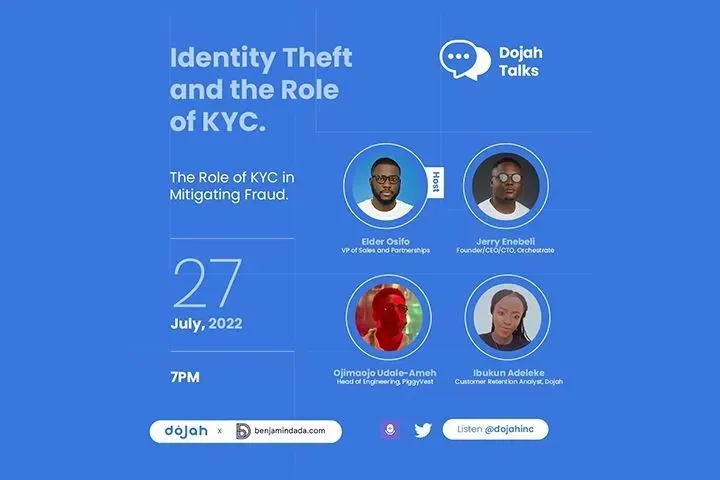How startups & individuals can prevent identity theft
A recap of Dojah and Benjamindada.com's Twitter space on Identity theft and the role of KYC

A recap of Dojah and Benjamindada.com Twitter space: Identity theft and the role of KYC.
Identity theft is a dilemma faced all around the world. Like other countries of the world, Nigeria is not exempted from the scourge of identity theft and other cyber-attacks.
On Wednesday, July 27th 2022, Dojah and Benjamindada.com held a Twitter space to discuss “Identity theft and the role of KYC.” The lineup of speakers were Jerry Enebeli, CEO/CTO of Orchestrate; Ojimaojo Udale-Ameh, Head of Engineering, Piggyvest; Ibukun Adeleke, Customer Retention Analyst, Dojah.
The conversation was both enlightening and insightful. In this article, I curated some of the responses the speakers provided on salient questions from the 1-hour Twitter Space.
According to Jerry Enebeli, identity theft is when an individual poses as someone else. It’s a broad concept which includes medical identity theft, financial identity theft, criminal identity theft, etc. The reason for identity theft is to commit fraud or engage in illegal activities.
Identity thieves pick a victim, steal every possible information about him and try to act like the person online. Identity theft is largely impersonation, according to Ojimaojo. It is obtaining another person’s personal information like name, date of birth, house address, and phone number illegally to use for financial gains.
Strategies fraudsters use to get access to people’s personal data include the creation of fake accounts, social engineering, phishing scams, and identity spoofing.
Subscribe to BD Insider
The role of KYC in battling identity theft?
KYC, which is know your customers is a role businesses can play in reducing identity theft. It’s putting measures in place to ensure customers signing up to access a product are who they claim to be.
Jerry said it starts from the initial onboarding identity checks, verifications and measures. It goes beyond that to include constant checks and analyses of the customer's behaviour on the platform.
This is because identity theft can happen after people have been granted access to a service or product. If the data of Jude, a customer of Gopay (a fintech app) is stolen, someone else can start posing as him and performing actions on that account. So, it's a never-ending process.
Strategies businesses can put in place to prevent bad actors
In Nigeria, the use of a Bank Verification Number (BVN) can be a countermeasure to prevent identity theft. Startups should also encourage their users to enable two-step verification to secure their accounts. Regularly reviewing accounts will help to spot fraudulent activities on time.
To combat identity theft, startups need to start thinking about 3-way authentication
— Benjamin Dada (@DadaBen_) July 27, 2022
- What you are
- What you know
- What you own
Can probably do a thread on it later. This has come up in two Spaces I've been on this week.
So what steps can I take as an individual to protect my identity?
"Individuals need to verify that the links, sites and platforms they are putting their information on are secure," Ibukun said. "Entering sensitive details on random platforms is putting yourself at risk."
Jerry Enebeli advised the use of secure passwords to secure sensitive data and leverage 2-factor authentication (2FA). In Nigeria, there’s this common issue of inactive or stolen phone numbers being reassigned to someone else.
So individuals who misplace, lose, or change their personal phone numbers should update their records on all platforms they’ve registered. This will prevent sensitive data from being sent to someone else. So frequently updating your information is vital.
Another important point raised by Ojimaojo is confirming the URL of a site before accessing it, using password managers, and not sharing too much information online.
To listen live to the conversation here's a recording of the conversation.







Comments ()